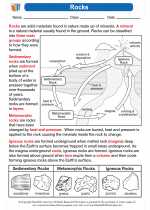Behavior
Behavior refers to the actions and reactions of an organism in response to stimuli from its environment or in relation to its own internal processes. It is a fundamental aspect of living organisms and can be observed in various forms across different species.
Types of Behavior
There are several types of behavior that can be observed in organisms:
- Instinctive Behavior: This type of behavior is innate and does not require learning. It is typically based on genetic programming and is exhibited in a consistent and predictable manner by all members of a species.
- Learned Behavior: This type of behavior is acquired through experience and interaction with the environment. It can vary among individuals of the same species based on their unique experiences.
- Social Behavior: Social behavior encompasses interactions and relationships between members of the same species. It includes behaviors such as communication, cooperation, competition, and territoriality.
- Territorial Behavior: Some organisms exhibit territorial behavior, defending and marking specific areas as their own.
- Migratory Behavior: Migratory behavior involves the seasonal movement of organisms from one region to another, often in search of food, breeding grounds, or favorable environmental conditions.
- Courtship and Mating Behavior: Many species display specific behaviors related to courtship and mating, which are essential for reproductive success.
- Aggressive Behavior: Aggressive behavior can be observed in various contexts, including competition for resources, defense of offspring, and establishment of social hierarchies.
Factors Influencing Behavior
Several factors can influence an organism's behavior, including:
- Genetics: Genetic makeup can predispose organisms to certain behavioral patterns and traits.
- Environment: The physical and social environment in which an organism lives can significantly impact its behavior.
- Learning and Experience: The experiences and interactions an organism undergoes can shape its behavior through the process of learning.
- Physiological State: Internal physiological conditions, such as hunger, thirst, and hormonal levels, can influence an organism's behavior.
- Social Interactions: Interactions with other members of the species and the dynamics of social groups can affect an organism's behavior.
Importance of Studying Behavior
Studying behavior is crucial for understanding the adaptation, survival, and reproduction of organisms. It provides insights into the ecological roles of different species, their interactions within ecosystems, and the factors that drive evolutionary change.
Study Guide
To understand the topic of behavior, consider the following study guide:
- Define behavior and explain its significance in the animal kingdom.
- Describe the different types of behavior exhibited by organisms, providing examples for each type.
- Discuss the factors that influence an organism's behavior, including genetic, environmental, and social factors.
- Examine the evolutionary implications of certain behaviors and their impact on species survival and reproduction.
- Compare and contrast instinctive and learned behaviors, highlighting their respective characteristics and adaptive advantages.
- Analyze specific examples of behavior in different species, illustrating how behavioral traits contribute to their ecological success.
◂Science Worksheets and Study Guides Sixth Grade. Rocks
Study Guide Rocks
Rocks  Activity Lesson
Activity Lesson Rocks
Rocks  Worksheet/Answer key
Worksheet/Answer key Rocks
Rocks  Worksheet/Answer key
Worksheet/Answer key Rocks
Rocks  Worksheet/Answer key
Worksheet/Answer key Rocks
Rocks  Worksheet/Answer key
Worksheet/Answer key Rocks
Rocks  Vocabulary/Answer key
Vocabulary/Answer key Rocks
Rocks  Vocabulary/Answer key
Vocabulary/Answer key Rocks
Rocks  Vocabulary/Answer key
Vocabulary/Answer key Rocks
Rocks 

 Activity Lesson
Activity Lesson
 Worksheet/Answer key
Worksheet/Answer key
 Worksheet/Answer key
Worksheet/Answer key
 Worksheet/Answer key
Worksheet/Answer key
 Worksheet/Answer key
Worksheet/Answer key
 Vocabulary/Answer key
Vocabulary/Answer key
 Vocabulary/Answer key
Vocabulary/Answer key
 Vocabulary/Answer key
Vocabulary/Answer key

The resources above cover the following skills:
EARTH AND SPACE SCIENCE
Earth’s Systems
Plan and carry out investigations that demonstrate the chemical and physical processes that form rocks and cycle Earth’s materials (e.g., processes of crystallization, heating and cooling, weathering, deformation, and sedimentation).